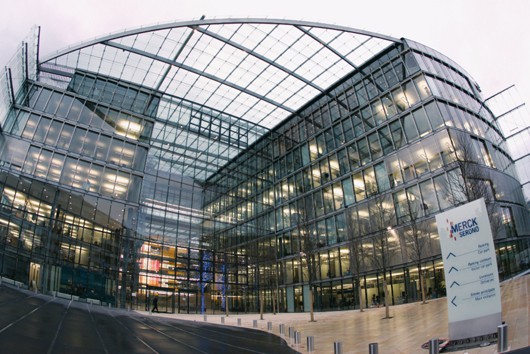
Exchange rate factors caused sales at Merck KGaA’s pharma unit Merck Serono to dip in the second quarter, but the company insists underlying organic growth is on track.
Overall group sales were down 4 per cent to €2.84bn but would have gained 3 per cent without the currency drag, which stemmed mainly from the devaluation of the Japanese yen. Similarly, underlying growth at Merck Serono was 2 per cent with the unit bringing in €1.53bn in the quarter.
Price increases for multiple sclerosis (MS) treatment Rebif (interferon-beta-1a), plus increasing take-up of a new pen injector version called RebiDose that now accounts for 6 to 9 per cent of total sales, helped Merck Serono’s flagship product to sales of €499m – a rise of 3.5 per cent.
The product held up well considering the onset of competition from oral MS treatments like Biogen Idec’s Tecfidera (dimethyl fumarate) and Novartis’ Gilenya (fingolimod), but all eyes are on the threat of generic competition to beta interferon products, which could start next year.
“We cannot deny that competition is tougher,” said Merck chief executive Matthias Zachert on the firm’s conference call with investors, although he stressed it remains to be seen how generics will be priced, suggesting price discounts will not be as steep as for other generic drugs.
Merck’s other leading pharmaceutical product – Erbitux (cetuximab) for cancer – fell almost 5 per cent to €215m, with gains from its approval for head and neck cancer in Japan earlier in the year offset by the yen effect.
Merck’s bottom line benefitted from the sale of its Geneva headquarters and other cost-cutting measures, with group earnings before interest, tax, depreciation and amortisation (EBITDA) rising 11 per cent to €826m, while Merck Serono saw EBITDA rise around 9 per cent to €491m.
Consumer health sales did better than expected with a 4 per cent sales contraction to €117m, although a refocusing of the unit on key brands is improving margins.
Lab equipment and consumable unit Merck Millipore had a strong quarter with reported growth of 2.6 per cent to €668m driven by gains at its Process Solutions unit, which markets products and services for pharmaceutical production.
Merck said it is now predicting €3.1bn to €3.2bn in EBITDA for the full year “despite currency headwinds”.
The potential for a fall-off in Rebif means that Merck needs its pharma pipeline to deliver another big seller in the next couple of years, and a lot is riding on phase III pancreatic cancer and sarcoma candidate TH-302 and MS candidate Tcelna (imilecleucel-T), which is in phase IIb.




